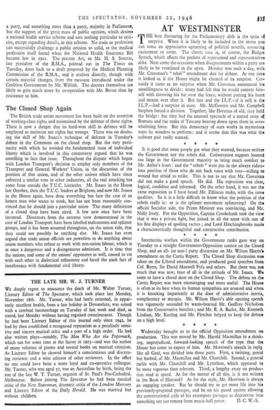AT WESTMINSTER
THE best flavouring for the Parliamentary dish is the spice of surprise. When it is likely to be included in the menu you can sense an appreciative upturning of political nostrils, savouring excitement to come. The classic case is, of course, the Budget Speech, which affects the pockets of represented and representatives alike. Next come the occasions when disagreements within a party are likely to be ventilated in the open. Monday was such a day, with Mr. Crossman's " rebel " amendment due for debate. At one time it looked as if the House might be cheated of its surprise. Cer• tainly it came as no surprise when Mr. Crossman announced his unwillingness to divide: many had felt that he would content him- self with throwing his hat over the fence, without putting his heart and mount over after it. But fate and the I.L.P.—if it still is the I.L.P.—had a surprise in store. Mr. McGovern and Mr. Campbell Stephen forced a division. Together, like Horatius of old, they held the bridge: but they had the unusual spectacle of a united army of Romans and the ranks of Tuscany bearing down upon them in over. whelming force. But this democracy of ours works in mysterious ways its wonders to perform: and it seems that this was what the stalwart pair really wanted.
* * * * It is good that some people got what they wanted, because neither the Government nor the rebels did. Conservative support loomed too large in the Government majority to bring much comfort to Mr. Attlee's heart : and the " rebels " were put in the always ridicu. lous position of those who do not back voice with vote—willing to wound but afraid to strike. This is not to say that Mr. Grossman did not make a good speech. He did. His exposition was clear, logical, confident and informed. On the other hand, it was not the same exposition as I have heard Mr. Zilliacus make, with the same qualities. So it is a little difficult to know what the position of the rebels really is: or is the splinter movement splintering? On the official Socialist side, the Prime Minister was convincing, and Mr. Nally lively. For the Opposition, Captain Crookshank took the view that it was a private fight, but joined in all the same with one of his fine displays of spoiling tactics ; and Lord Hinchingbrooke made a characteristically thoughtful and constructive contribution.
* * * *
Internecine warfare within the Government ranks gave way on Tuesday to a straight Government-Opposition contest on the Closed Shop, and an all- (or non-) party discussion on Mr. Wilson Harris's amendment on the Curtis Report. The Closed Shop discussion was taken on the Liberal amendment, and produced good speeches from Col. Byers, Sir David Maxwell Fyfe and others. But there was not much that was new, least of all in the attitude of Mr. Isaacs. We seem to have a closed door on the Closed Shop. The debate on the Curtis Report was more encouraging and more useful. The House is often at its best when its human sympathies are aroused and when
it is knocking impatiently at the door of administrative inertia, complacency or myopia. Mr. Wilson Harris's able opening speech
was vigorously seconded by warm-hearted Mr. Godfrey Nicholson from the Conservative benches ; and Mr. R. A. Butler, Mr. Kenneth Lindsay, Mr. Keeling and Mr. Fletcher helped to keep the debate on a high level.
* * * *
Wednesday brought us to the official Opposition amendment on production. This was moved by Mr. Harold Macmillan in a think- ing, unprejudiced, forward-looking speech of the type that the House has come to expect of him. Mr. Morrison's speech in reply like all Gaul, was divided into three parts. First, a twitting, genial but barbed, of Mr. Macmillan and Mr. Churchill. Second, a general melee with Mr. Churchill and Mr. Lyttelton, which appeared to be more vigorous than relevant. Third, a lengthy essay on produc- tion read at speed. As for the matter of all this, is it not written in the Book of Hansard? As for the style, Mr. Morrison is always an engaging speaker. But he should try to get more life into his previously-prepared passages, and be on his guard against allowing the conversational style of his extempore passages to degenerate into
something not too remote from music-hall patter. D. C. W.-S.


































 Previous page
Previous page